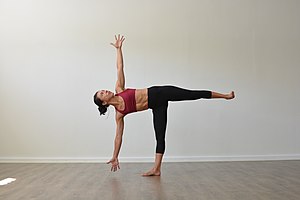
Ardha Chandrasana (Sanskrit: अर्धचन्द्रासन; IAST: ardha chandrāsana) or Half Moon Pose is a standing asana in modern yoga as exercise.
Etymology and origins
The name comes from the Sanskrit words अर्ध ardha meaning "half", चन्द्र chandra meaning "moon", and आसन āsana meaning "posture" or "seat".
The 19th century Sritattvanidhi uses the name Ardha Chandrasana for a different pose, Vrikshasana. Swami Yogesvarananda used the name in his 1970 First Steps to Higher Yoga for a pose similar to Kapotasana, Pigeon. The modern usage of the name is found in B. K. S. Iyengar's 1966 Light on Yoga.
Practice and benefits

The pose is entered from Trikonasana (triangle pose), where one foot is kept forward. The arm opposite to the foot that is forward would come onto the hip. While stretching up with the rear leg and out with the front hand so that only the fingertips remain on the ground, the hand on the hip can gradually reach up towards the ceiling. The gaze is directed at the upper hand. However, Iyengar describes the pose with the upper hand resting on the hip.
The pose helps to strengthen the ankles and improve balance.
Variations
- Parivrtta Ardha Chandrasana (Revolved Half Moon Pose) has the body revolved towards the standing leg.
- Baddha Parivrtta Ardha Chandrasana (Bound Revolved Half Moon Pose) has the body revolved towards the standing leg with arms bound around the standing leg.
Other 'half moon' poses
In Sivananda Yoga and its derivative styles such as the Bihar School of Yoga, half moon pose is Anjaneyasana, an asana used in the moon salutation series (Chandra Namaskar).
In Bikram Yoga, the name "half moon pose" is given to a two-legged standing side bend, elsewhere called Indudalasana.
References
- "Ardha Chandrasana". Retrieved 2011-04-09.
- McGilvery, Carole; Mehta, Mira (2002). The Encyclopedia of Aromatherapy, Massage and Yoga. Hermes House. p. 247. ISBN 978-1-84309-129-5.
- Sinha, S. C. (1 June 1996). Dictionary of Philosophy. Anmol Publications. p. 18. ISBN 978-81-7041-293-9.
- ^ Sjoman, Norman E. (1999) . The Yoga Tradition of the Mysore Palace. Abhinav Publications. pp. 82, 90. ISBN 81-7017-389-2.
- Iyengar, B.K.S. (1979) . Light on Yoga. Schocken. pp. 74–76. ISBN 0-8052-1031-8.
- ^ Costello, Nikki (17 June 2013). "Balance Mind & Body: Half Moon: Balance, strengthen, and lengthen in Half Moon Pose". Yoga Journal. Retrieved 8 February 2022.
- ^ Anon (28 August 2007). "Half Moon Pose". Yoga Journal.
- Mehta, Silva; Mehta, Mira; Mehta, Shyam (1990). Yoga: The Iyengar Way. Dorling Kindersley. pp. 30–31.
{{cite book}}: CS1 maint: multiple names: authors list (link) - Iyengar, B. K. S. (1979) . Light on Yoga: Yoga Dipika. Unwin Paperbacks. pp. 74–76.
- "Parivrtta Ardha Chandrasana (Revolved Half Moon Pose)". Fitz-Simon, Witold. Retrieved 11 January 2019.
- "Baddha Parivritta Ardha Chandrasana (Bound Revolved Half Moon Pose)". Yogateket, Witold. Retrieved 11 March 2019.
- Lidell, Lucy; The Sivananda Yoga Centre (1983). The Book of Yoga: the complete step-by-step guide. Ebury. pp. 132–133. ISBN 978-0-85223-297-2. OCLC 12457963.
- Mirsky, Karina. "A Meditative Moon Salutation". Yoga International. Retrieved 23 July 2019.
- "26 Bikram Yoga Poses". Bikram Yoga Poses Guide. Retrieved 23 July 2019.
- "Indudalasana". Yogapedia. Retrieved 23 July 2019.
Further reading
- Saraswati, Swami Satyananda (1 August 2003). Asana Pranayama Mudra Bandha. Nesma Books India. ISBN 978-81-86336-14-4.
| Yoga as exercise | ||||||||||||||
|---|---|---|---|---|---|---|---|---|---|---|---|---|---|---|
| Topics |
|  | ||||||||||||
| History |
| |||||||||||||
| Schools (Gurus) |
| |||||||||||||
| Related | ||||||||||||||
